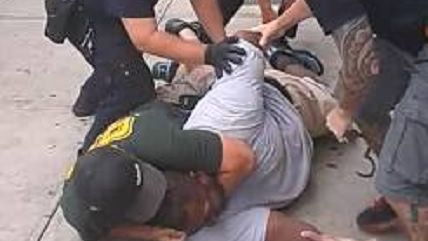The Government Killed Eric Garner for Threatening One of Its Revenue Streams
Here's one way to help reduce how often cops harass, beat, and kill peaceful citizens.

The cops who ganged up on Eric Garner, put him in a chokehold, and mashed his face into the sidewalk didn't intend to kill him. They intended only to show him who's boss on the streets of Staten Island—and show him in a way he would never forget.
As a Facebook friend of mine put it, instead they showed him in a way he will never remember.
This pretty much explains the cops' reckless disregard for Garner's life that day, and it is what makes the grand-jury sham especially appalling.
This was about power. Yes, to an extent the fatal confrontation was about race—although it's no great feat to imagine something similar happening to a low-income white guy. It was also about class. An obviously affluent and likely well-connected person probably need not fear being accosted on the street by the police.
Let's remember what the police accuse Garner of doing: selling cigarettes that had not been subjected to the high taxes imposed in New York City and State: $5.95 in all. (The feds add another buck.) Thus, a pack costs at least $14. As a result, entrepreneurial cigarette smuggling from low-tax states is big business. Whenever the tax goes up, so does the smuggling.
In fact, smuggling used to be an honorable American profession. In colonial times and into the early national period, the entrepreneurial smuggler who served consumers by defying the customs agents was celebrated. It was the government agent who risked being tarred and feathered, then rode out of town on a rail. Had Eric Garner been set upon by Red Coats on colonial New England streets, many people might have come to his defense. Today the best we can hope for is that someone will video the confrontation with a cell phone.
The fact is that Eric Garner was a threat to no one. He was just a guy trying to make a few bucks by selling loose cigarettes—loosies—to low-income smokers harmed by the state's and city's tax collectors.
Well, let's amend that. Garner, like other practitioners of his trade, was indeed a threat—to the politicians who need that revenue to play their destructive games and to assure they remain in power. Come to think of it, in the eyes of those politicians, threatening the steady flow of taxpayer money is about as serious a crime as anyone can commit. Without that money they would be nothing.
That's why New York City officials, including Mayor Bill de Blasio, one of those phony men-of-the-people, have ordered the police to crack down on sellers of loosies.
The city's accomplices in this highway robbery of smokers are the licensed retailers. The police provide the protection racket that shields the retailers' cigarette business from free competition.
To great fanfare de Blasio announced a program to prevent a recurrence of the confrontation that killed Eric Garner. The police will get new training, blah, blah, blah.
Sorry, Mr. Mayor, but that won't do it. Some truly radical things need to be done—such as eliminating the top-down, militarist model of policing, and moving to a decentralized system of community governance. But something significant can be done in the meantime: halt police confrontations with nonviolent persons suspected of committing victimless so-called crimes. These are acts that in themselves violate no one's rights, such as selling or possessing drugs and guns, taking bets, and participating in other prohibited but peaceful, consensual activities.
This won't guarantee there will be no more Eric Garners, because police have long harassed, beaten, and killed people using low-tech weapons and without the cover of victimless-crime laws. But it would help. If fewer people are harassed on the street, fewer people will become fed up and resist—if we must stretch the word resist to describe what Eric Garner did that fateful day.
Low-income minority neighborhoods experience what the rest of us can usually grasp only abstractly: the police force is an occupying army. Its ostensible purpose is to protect innocent life and property, but what it does day to day is monitor everyone with a suspicion that the sovereign's decrees are not being respected.
This has got to change.
This article originally appeared at the Future of Freedom Foundation.


Show Comments (47)